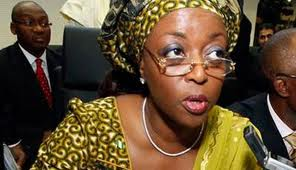Minister of Petroleum Resources Mrs Diezani Alison-Madueke, in Abuja described the fiscal terms proposed in the Petroleum Industry Bill (PIB) as fair. Alison-Madueke said this at a panel discussion on “PIB and the Future of Nigeria’s Oil Industry’’ at the 18th Nigeria Economic Summit. She said that Nigeria still remained one of the most attractive countries in terms of fiscal regime or “government take’’.
The minister said that the total government share of oil revenues after all taxes and royalties was 73 per cent, up from 61 per cent in current deals with oil majors. Alison-Madueke said that Nigeria was not alone in the tightening of the fiscal terms. She said the goal was to achieve a “fair balance between government and contractor share to ensure that risks do not outweigh rewards.’’
“We feel that the fiscal terms are fair but we will continue discussions with our partners, looking for a way in which both sides of the scale can go forward. Also, all cost based incentives have now been replaced with production based incentives, because government revenues come from production and not from cost.’’ She said the draft bill, which is still before the National Assembly, introduced a price-based royalty for crude prices beyond 70 dollars per barrel. She added that current deep water terms were negotiated in 1993 when oil prices were just 20 dollars a barrel.
“Section 16 of the Deep Offshore Act prescribes that changes be made to this particular fiscal regime to restore benefits to the government commensurate with increased oil prices, once oil prices have exceeded 20 dollars per barrel in real terms.’’ According to her, the Act also prescribes that changes be made 15 years after the commencement of the Deep Offshore Act. This, therefore, imposes stricter discipline on cost escalations and de-incentives gold platting.’’
The minister explained that the reforms in the draft had been divided into two areas namely, the fiscal and non-fiscal reforms. According to her, the non-fiscal reforms relate to institutional and policy reorientation, while the fiscal reforms represent the largest overhaul of government petroleum revenue system in the last four decades. She identified four central objectives of the fiscal reforms to include simplification of revenue collection by government and capturing of windfall profits in the event of high oil prices. Under the new fiscal regime, she said the draft proposed collection of more revenue from large profitable fields in deep offshore waters.
She said the new regime also sought to create employment and business opportunities in the country by encouraging investments in small oil and gas fields. The minister told participants and panellists at the summit that the proposed bill also sought to harmonise oil and gas fiscal systems. “Gas fiscal terms are now fully integrated into the oil fiscal terms and this is the first time this has happened in Nigeria.’’
According to statistics, the country has 187 trillion cubic feet of proven gas reserves. In his remarks, Mr Austin Avuru, Managing Director, Seplat Petroleum Development Company, cautioned against reducing the PIB discussions to fiscal issues such as “tax and royalty’’. The cardinal point of the reforms is to make certain institutions more effectively in the oil and gas sector,’’ he said. Avuru called for the “de-coupling’’ of the fiscal regime from the PIB and advised government to address key issues killing investment in the oil and gas sector of the country. He maintained that the current fiscal regime as proposed in the draft was harsh and suggested that government should allow the “fiscal regime to self adjust itself.’’

